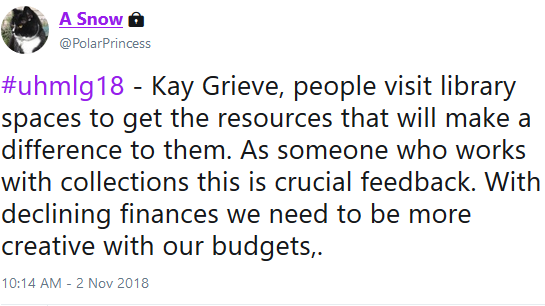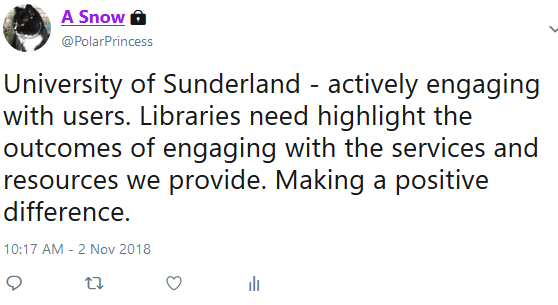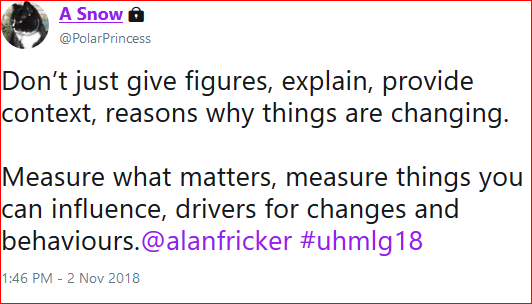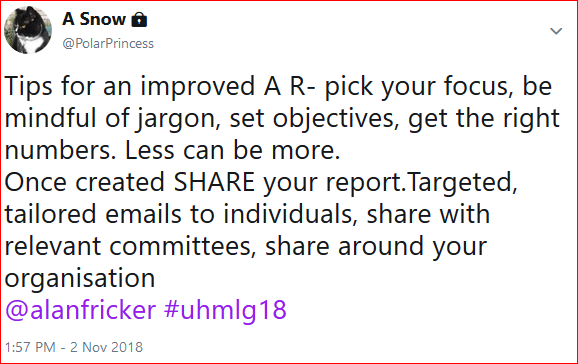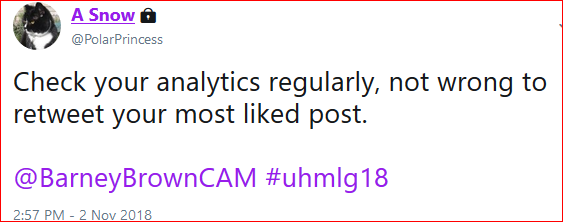
An interesting theme for this Spring Forum. No matter where you work, helping our users, engagement and “Getting the message across” is pertinent to us all.
I found the day informative and inspiring. Over the course of the day, it became very apparent how many different users, libraries can assist and in many ways that I had not considered.
Users are your membership, the public, not just limited to one country, engagement is possible in person and also virtually. Help is required not just with day to day library queries but in providing spaces and environment that are conducive to learning and well-being.
Challenges’ include income generation, Working across countries does not mean that we all have the access to the same resources. Don’t make assumptions’ that we KNOW what resources are required in the receiving countries. Work with the staff ‘on the ground’. Be an active listener and heed the information you are given.
We are all aware of providing information to our users and assisting with the ‘not so straightforward’ information questions and resources. The Kings Fund (a charity founded by King Edward VII), specialises in grey literature and health policies. They produce several alerts and bulletins including:
- Health Management & Policy Alert – stats, policy and practice, hard to find information and correspondence
- Health & Wellbeing Board Bulletin – local & national news
- Integrated Care Bulletin – partnership, co-ordination and collaboration focus
In addition to the training skills and literature searches that we are familiar with, the Kings Fund has a role in helping patients/general public find their way through complicated health information.
Their challenges include;
- Income generation and balancing this with the usual day-to-day tasks.
- Managing the impact that general elections have on their workload.
Moving outside the UK to working in partnership with LMIC (Low Middle Income Countries), we learned about the importance of collaborating with libraries aboard and the rewards and obstacles. Librarians from the University of Cardiff are part of the Phoenix Project with the University of Namibia. The project provides opportunities for shared learning and development across a number of university departments including the library.
The Oxford Book Transplant is an initiative by Oxford Medical Students. Students take books in their luggage when they go on their electives as a way of saying ‘Thank You’. The aim is to provide textbooks to hospitals and medical schools in LMIC. The health library and NHS libraries are collecting points for books.
Mission Botswana is part of Anglia Ruskin University International community Experience Project
In Tlokweng, this project is helping to renovate a library and football/sports area for children.
Benefits’ of the project include;
- Sharing experiences
- Teamwork
- Gaining new skills and confidence
- Employability
- Building partnerships’
- Supporting learning
- Well-being
- Imparting basic health practices – such as hand washing
- Engage with the children
- Reading and literacy support.
Academic libraries are a key resource to supporting student wellbeing, how and why will become apparent. (Presentation from Antony Brewerton – Head of Academic Services – University of Warwick – @librarian_boy)
The University of Warwick asked students what their first impressions of the library are. Responses include –
- “It’s very big”
- “There’s lots of books”
- “I feel really overwhelmed”
The library is very active in supporting their users. They see part of their role in upskilling users and helping students settle into University life. The library works with other university departments to provide a joined up approach.
Skills opportunities are available in information retrieval, presentations skills, project management, and time management. A holistic approach is taken with local travel information provided, a calendar of events, amenities guide, and history of the place, resilience and well-being.
The Library is a venue for cultural events such as Kammatan. Harvest Festival celebrated throughout May in Sabah Malaysia. The Library promotes the NHS 5 Ways to Well-Being
- Connect (e.g. student network with staff)
- Be Active
- Give
- Take Notice (e.g. mindfulness sessions)
- Keep Learning (e.g. language exchanges).
As well as bringing therapy dogs into the library, rewarding significant milestones in a student’s educational life – handing in their dissertation.
Claire Allen from Evidence Aid & Isla illustrated a very positive example of the difference that librarians’ can make. Isla has been volunteering with Evidence Aid. Reading articles, writing a synopsis, indicating if it is a good or bad article. Then uploaded on DropBox and then checked and published.
Benefits include;
- Keeping skills up to date
- Amassing new skills
- Sharing new skills with work colleagues
- Presentation skills
- Attending conferences to highlight the charity and how we can get involved
- Contributing to humanitarian issues
Evidence Aid was founded in 2004 following Indian Ocean Tsunami. Mission – To alleviate suffering & save lives by providing the best available evidence on the effectiveness of humanitarian action and enabling its use.
Natasha Sheen informed the audience about The Hive. The first academic and public library joint venture in Worcester.
The Hive opened in 2012 and comprises University and Public library services and the county archives service. .
Facts and Figures;
- The Hive is part of Worcestershire Public Libraries of which there are 21 branches
- 275,000 + (book) items
- Natasha teaches info lit sessions, organises and co-ordinate events
- Natasha’s role is there to make a difference across the County
- Make a lot of academic journals available to the public through walk in access
- Works with different research depts. and groups, including Ecology and Environment RG – Gardening for wildlife, Mood Disorders Research Group, Association for Dementia studies and Centre for Palliative Care.
- Science Festival events, events to support children’s mental health.
- Marketing
- wide range of facilities for users with a range of accessibility requirements
Challenges;
- Getting people in
- Getting people to engage, (we are not university so how can it be for me?)
- Encouraging researchers and academics to get involved.
- People still work in silos.
- Overlap – more collaboration and communication needed so The Hive do not put on an event that has recently happened or vice versa.
- Measuring Impact.
The final part of the day, a series of Lightning Talks:
Chris Bark (Uni. of Coventry) – Supporting Other Users: Phoenix Partnership & Partner Colleges
Phoenix Partnership schools benefit from a direct relationship with the University of Coventry. 700 post 16 children use the library for study area, access to print books. A LibGuide has been specifically written for this user group. Whilst this is a great opportunity to break down barriers and provide an insight into HE as always it is not without its issues. For example, should this group have access to electronic resources? What about pressure on spaces especially during exam times and competition for resources. I don’t have an easy answer to these questions.
Iain Baird – (Academic Librarian – Uni. of Teeside) talked about the Succeed@Tees initiative.
A Learning Hub created within the Library about 5 years ago. Primary aim being an Academic Skills support centre. Staffed with 2 former librarians and a specialist. Courses include;
- Academic writing
- Apostrophes’ & how to use them,
- Using CINAHL
- Referencing
- Critical Thinking
- Critical Writing
- Presentation Skills
- Reflective writing
I am sure I am not alone in thinking I could benefit from some of the above sessions.
The outcome of the Learning Hub is that it has had a very positive impact on teaching sessions.
Emma Silvey – (Assistant Librarian Clinical and Outreach – Southend University Hospital NHS Foundation)
The library in the Trust has a well-being zone used by staff and students. The library work with other depts. in the Trust to promote services especially during Libraries Week. Library staff visit colleagues working off site and organise pop-up libraries in the hospital.
Jane Shelley – continued with the theme of outreach and promotion with the libraries at Anglia Ruskin University participating in University open days and special events. Local schools visit the campuses to discover the HE experience and libraries have been involved in these visits.
So – I have traveled to London for the meeting but heard of libraries working internationally with Evidence Aid, The Phoenix Project, Mission Botswana and Oxford Book Transplant. Library doors are open to the public, school children, physical and virtual users. Barriers are being broken down with access to resources and perceptions of HE, libraries and what libraries can do.
Our library is very service orientated. Users from all areas of HE, research and the NHS. We take our services out of the physical library space and into student common rooms, hospital concourse, sports and social club for example. Of course there is always more that we can try.
There is a very real positive impact on society just from the projects and stories heard in this Forum. Encouraging messages of collaboration, partnerships, widening engagement and raising awareness. The last presentation of the day included “nothing is impossible – the word itself is I’m possible”. A great ending.
Slides from the Forum can be found – https://tinyurl.com/y7od57nk and https://tinyurl.com/y8tcyn8z

